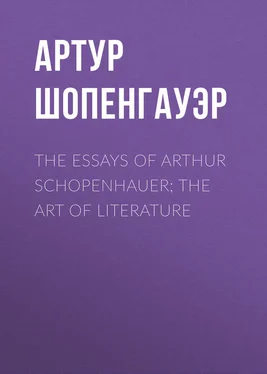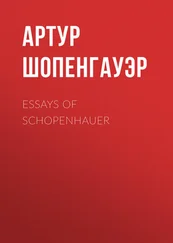Артур Шопенгауэр - The Essays of Arthur Schopenhauer; The Art of Literature
Здесь есть возможность читать онлайн «Артур Шопенгауэр - The Essays of Arthur Schopenhauer; The Art of Literature» — ознакомительный отрывок электронной книги совершенно бесплатно, а после прочтения отрывка купить полную версию. В некоторых случаях можно слушать аудио, скачать через торрент в формате fb2 и присутствует краткое содержание. Жанр: Философия, literature_19, foreign_antique, foreign_prose, на английском языке. Описание произведения, (предисловие) а так же отзывы посетителей доступны на портале библиотеки ЛибКат.
- Название:The Essays of Arthur Schopenhauer; The Art of Literature
- Автор:
- Жанр:
- Год:неизвестен
- ISBN:нет данных
- Рейтинг книги:3 / 5. Голосов: 1
-
Избранное:Добавить в избранное
- Отзывы:
-
Ваша оценка:
- 60
- 1
- 2
- 3
- 4
- 5
The Essays of Arthur Schopenhauer; The Art of Literature: краткое содержание, описание и аннотация
Предлагаем к чтению аннотацию, описание, краткое содержание или предисловие (зависит от того, что написал сам автор книги «The Essays of Arthur Schopenhauer; The Art of Literature»). Если вы не нашли необходимую информацию о книге — напишите в комментариях, мы постараемся отыскать её.
The Essays of Arthur Schopenhauer; The Art of Literature — читать онлайн ознакомительный отрывок
Ниже представлен текст книги, разбитый по страницам. Система сохранения места последней прочитанной страницы, позволяет с удобством читать онлайн бесплатно книгу «The Essays of Arthur Schopenhauer; The Art of Literature», без необходимости каждый раз заново искать на чём Вы остановились. Поставьте закладку, и сможете в любой момент перейти на страницу, на которой закончили чтение.
Интервал:
Закладка:
What the address is to a letter, the title should be to a book; in other words, its main object should be to bring the book to those amongst the public who will take an interest in its contents. It should, therefore, be expressive; and since by its very nature it must be short, it should be concise, laconic, pregnant, and if possible give the contents in one word. A prolix title is bad; and so is one that says nothing, or is obscure and ambiguous, or even, it may be, false and misleading; this last may possibly involve the book in the same fate as overtakes a wrongly addressed letter. The worst titles of all are those which have been stolen, those, I mean, which have already been borne by other books; for they are in the first place a plagiarism, and secondly the most convincing proof of a total lack of originality in the author. A man who has not enough originality to invent a new title for his book, will be still less able to give it new contents. Akin to these stolen titles are those which have been imitated, that is to say, stolen to the extent of one half; for instance, long after I had produced my treatise On Will in Nature , Oersted wrote a book entitled On Mind in Nature .
A book can never be anything more than the impress of its author's thoughts; and the value of these will lie either in the matter about which he has thought , or in the form which his thoughts take, in other words, what it is that he has thought about it.
The matter of books is most various; and various also are the several excellences attaching to books on the score of their matter. By matter I mean everything that comes within the domain of actual experience; that is to say, the facts of history and the facts of nature, taken in and by themselves and in their widest sense. Here it is the thing treated of, which gives its peculiar character to the book; so that a book can be important, whoever it was that wrote it.
But in regard to the form, the peculiar character of a book depends upon the person who wrote it. It may treat of matters which are accessible to everyone and well known; but it is the way in which they are treated, what it is that is thought about them, that gives the book its value; and this comes from its author. If, then, from this point of view a book is excellent and beyond comparison, so is its author. It follows that if a writer is worth reading, his merit rises just in proportion as he owes little to his matter; therefore, the better known and the more hackneyed this is, the greater he will be. The three great tragedians of Greece, for example, all worked at the same subject-matter.
So when a book is celebrated, care should be taken to note whether it is so on account of its matter or its form; and a distinction should be made accordingly.
Books of great importance on account of their matter may proceed from very ordinary and shallow people, by the fact that they alone have had access to this matter; books, for instance, which describe journeys in distant lands, rare natural phenomena, or experiments; or historical occurrences of which the writers were witnesses, or in connection with which they have spent much time and trouble in the research and special study of original documents.
On the other hand, where the matter is accessible to everyone or very well known, everything will depend upon the form; and what it is that is thought about the matter will give the book all the value it possesses. Here only a really distinguished man will be able to produce anything worth reading; for the others will think nothing but what anyone else can think. They will just produce an impress of their own minds; but this is a print of which everyone possesses the original.
However, the public is very much more concerned to have matter than form; and for this very reason it is deficient in any high degree of culture. The public shows its preference in this respect in the most laughable way when it comes to deal with poetry; for there it devotes much trouble to the task of tracking out the actual events or personal circumstances in the life of the poet which served as the occasion of his various works; nay, these events and circumstances come in the end to be of greater importance than the works themselves; and rather than read Goethe himself, people prefer to read what has been written about him, and to study the legend of Faust more industriously than the drama of that name. And when Bürger declared that "people would write learned disquisitions on the question, Who Leonora really was," we find this literally fulfilled in Goethe's case; for we now possess a great many learned disquisitions on Faust and the legend attaching to him. Study of this kind is, and remains, devoted to the material of the drama alone. To give such preference to the matter over the form, is as though a man were to take a fine Etruscan vase, not to admire its shape or coloring, but to make a chemical analysis of the clay and paint of which it is composed.
The attempt to produce an effect by means of the material employed – an attempt which panders to this evil tendency of the public – is most to be condemned in branches of literature where any merit there may be lies expressly in the form; I mean, in poetical work. For all that, it is not rare to find bad dramatists trying to fill the house by means of the matter about which they write. For example, authors of this kind do not shrink from putting on the stage any man who is in any way celebrated, no matter whether his life may have been entirely devoid of dramatic incident; and sometimes, even, they do not wait until the persons immediately connected with him are dead.
The distinction between matter and form to which I am here alluding also holds good of conversation. The chief qualities which enable a man to converse well are intelligence, discernment, wit and vivacity: these supply the form of conversation. But it is not long before attention has to be paid to the matter of which he speaks; in other words, the subjects about which it is possible to converse with him – his knowledge. If this is very small, his conversation will not be worth anything, unless he possesses the above-named formal qualities in a very exceptional degree; for he will have nothing to talk about but those facts of life and nature which everybody knows. It will be just the opposite, however, if a man is deficient in these formal qualities, but has an amount of knowledge which lends value to what he says. This value will then depend entirely upon the matter of his conversation; for, as the Spanish proverb has it, mas sabe el necio en su casa, que el sabio en la agena – a fool knows more of his own business than a wise man does of others.
ON STYLE
Style is the physiognomy of the mind, and a safer index to character than the face. To imitate another man's style is like wearing a mask, which, be it never so fine, is not long in arousing disgust and abhorrence, because it is lifeless; so that even the ugliest living face is better. Hence those who write in Latin and copy the manner of ancient authors, may be said to speak through a mask; the reader, it is true, hears what they say, but he cannot observe their physiognomy too; he cannot see their style . With the Latin works of writers who think for themselves, the case is different, and their style is visible; writers, I mean, who have not condescended to any sort of imitation, such as Scotus Erigena, Petrarch, Bacon, Descartes, Spinoza, and many others. An affectation in style is like making grimaces. Further, the language in which a man writes is the physiognomy of the nation to which he belongs; and here there are many hard and fast differences, beginning from the language of the Greeks, down to that of the Caribbean islanders.
To form a provincial estimate of the value of a writer's productions, it is not directly necessary to know the subject on which he has thought, or what it is that he has said about it; that would imply a perusal of all his works. It will be enough, in the main, to know how he has thought. This, which means the essential temper or general quality of his mind, may be precisely determined by his style. A man's style shows the formal nature of all his thoughts – the formal nature which can never change, be the subject or the character of his thoughts what it may: it is, as it were, the dough out of which all the contents of his mind are kneaded. When Eulenspiegel was asked how long it would take to walk to the next village, he gave the seemingly incongruous answer: Walk . He wanted to find out by the man's pace the distance he would cover in a given time. In the same way, when I have read a few pages of an author, I know fairly well how far he can bring me.
Читать дальшеИнтервал:
Закладка:
Похожие книги на «The Essays of Arthur Schopenhauer; The Art of Literature»
Представляем Вашему вниманию похожие книги на «The Essays of Arthur Schopenhauer; The Art of Literature» списком для выбора. Мы отобрали схожую по названию и смыслу литературу в надежде предоставить читателям больше вариантов отыскать новые, интересные, ещё непрочитанные произведения.
Обсуждение, отзывы о книге «The Essays of Arthur Schopenhauer; The Art of Literature» и просто собственные мнения читателей. Оставьте ваши комментарии, напишите, что Вы думаете о произведении, его смысле или главных героях. Укажите что конкретно понравилось, а что нет, и почему Вы так считаете.












